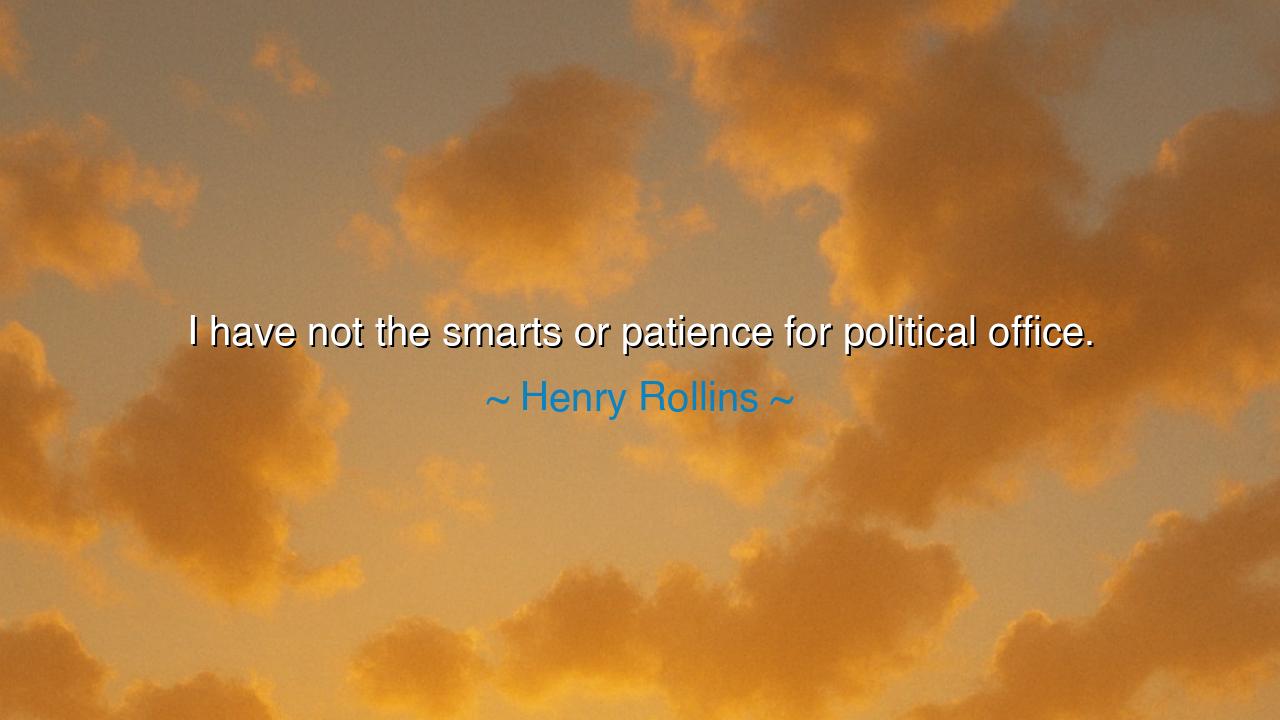
I have not the smarts or patience for political office.






Hear the voice of Henry Rollins, who spoke with bluntness and fire: “I have not the smarts or patience for political office.” Though simple, these words resound with wisdom, for they reveal that not all callings are meant for every man, and not every spirit is shaped for the labyrinth of governance. In them we hear both humility and defiance: humility, in admitting the limits of one’s gifts; defiance, in refusing to wear a crown that does not fit. It is a lesson as old as time—that to know thyself is the beginning of wisdom.
The ancients would have understood Rollins well. For in the Republic of Plato, it was said that the philosopher who rules must possess both knowledge and patience, guiding the city not with rage or haste, but with calm vision. But the warrior, whose strength is in battle, cannot endure the endless debates of the council. Nor can the poet, who burns with passion, easily bind himself to the slow rituals of compromise. Thus, to step into political office without the smarts for strategy or the patience for process is to enter battle unarmed. Rollins, like a warrior-poet of modern times, knew this truth, and spoke it boldly.
History, too, provides mirrors of this wisdom. Consider George Washington, who accepted the presidency only with reluctance, for he understood the burden of political office. Though he possessed the patience and the vision to endure, he also longed to return to his farm. He did not seek the office for pride, but because his gifts suited it, and the nation demanded it. Contrast him with others—men who craved power but lacked wisdom—whose reigns ended in corruption, failure, or disgrace. Rollins reminds us that greatness lies not in seeking every throne, but in knowing which throne one is fit to bear.
In truth, political office demands more than talent—it demands endurance of the spirit. It is a realm of compromise, of slow turns, of battles fought not with swords but with words, patience, and alliances. The fiery soul who thrives in art, music, or rebellion may find it a prison, their energy consumed by the endless machinery of bureaucracy. Thus, Rollins’ rejection of such a path is not weakness, but wisdom. He chose to fight in the arena of words, of music, of passion, where his voice could ring unchained, rather than be bound by the rituals of lawmaking.
The deeper meaning of his words is this: each of us must discern where our gifts can best serve the world. Some are builders, some are rulers, some are warriors, some are poets. To force the poet into the council, or the ruler into the battlefield, is to betray their nature. Rollins understood himself and therefore refused the mantle that was not his. His calling was not in offices of power, but in the stage, the page, and the unrelenting fire of truth spoken to the people.
The lesson for us, then, is clear. Do not envy every throne, nor covet every title. Instead, look inward and ask: where do my smarts lie? Where does my patience endure? What task was I shaped to fulfill? For to know yourself is greater than to hold office, and to serve in your true calling is nobler than to stumble in another’s. The world does not need all men to be politicians; it needs each man and woman to fulfill their own gift, whether in art, in craft, in leadership, or in service.
Practical actions arise from this truth: examine your nature, your strengths, and your limits. Do not force yourself into paths where your soul will wither. If you are called to lead, lead with courage; if not, support the leaders with the strength of your own craft. Honor the gifts of others, but cultivate your own. And above all, never despise your calling if it differs from the world’s definition of power. For true power lies not in office, but in authenticity, in using your voice and your life where they can burn brightest.
Thus let Rollins’ words endure as a reminder: *“I have not the smarts or patience for *political office.” Better the man who knows his limits than the one who seeks crowns he cannot bear. In truth, wisdom lies not in holding every role, but in fulfilling the one that destiny has placed within your grasp. And in this, we find the true nobility of the human spirit: not to be everything, but to be fully, powerfully, and truthfully oneself.






AAdministratorAdministrator
Welcome, honored guests. Please leave a comment, we will respond soon